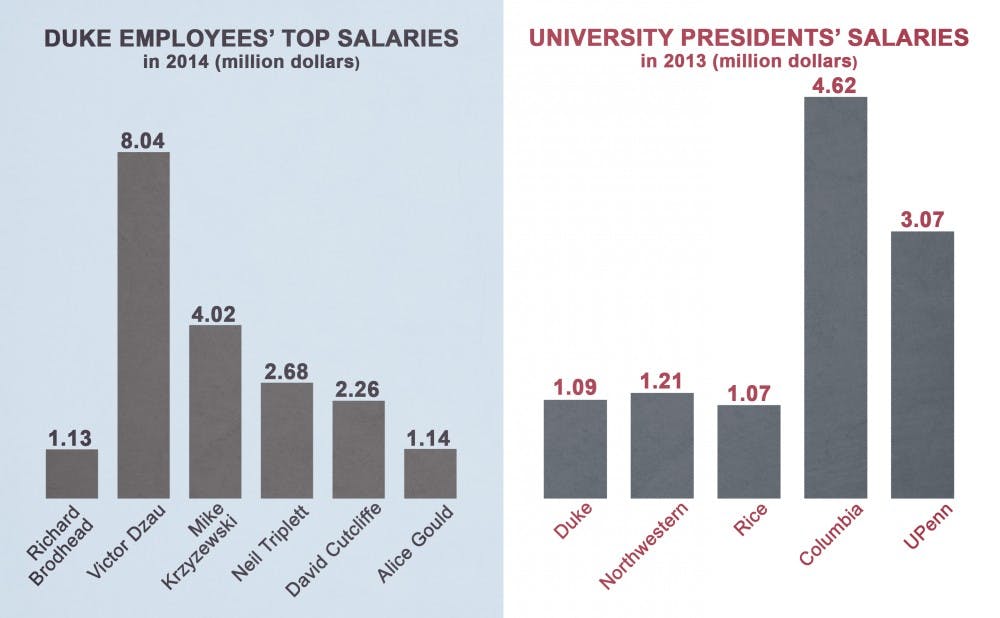As the presidential search committee looks for President Richard Brodhead's successor, one key point of discussion will be the salary of the new president.
According to 2014 Internal Revenue Service forms obtained by The Chronicle, Brodhead earned $1.13 million in "reportable compensation from the organization" in 2014, making him the sixth highest paid employee of the University. A report by the Chronicle of Higher Education on college presidents had Brodhead’s salary ranked 20th among universities nationwide in 2013.
“There is no pre-set salary for the next president,” wrote Michael Schoenfeld, vice president for public affairs and government relations, in an email.
Schoenfeld noted the salary of the new president could be lower or higher than Brodhead’s current compensation depending on a number of factors.
"The Board [of Trustees] will consider many excellent candidates and set compensation at a level that is appropriate for Duke and the candidate," he wrote.
Compared to other presidents
Brodhead took over as president for Nannerl Keohane in 2004. Keohane’s reportable compensation in 2003 was set at $510,000 per year, based on IRS 990 forms from her last year. In his first year, Brodhead earned a lower salary of $500,000, which became $517,500 in 2005 and has since increased to its $1.13 million level in 2014.
Data for 2015 is not yet available.
Brodhead's pay is comparable to other university presidents, noted the Chronicle of Higher Education report. Morton Schapiro, Northwestern University's president, earned $1.21 million in 2013. President David Leebron from Rice University earned $1.07 million, and Stanford University's president John Hennessy earned $963,248.
However, some university presidents make more money than Brodhead. Columbia University's Lee Bollinger earned $4.62 million in 2013 and Amy Gutmann, president of the University of Pennsylvania, earned $3.07 million.
Compared to Duke staff
Brodhead’s reportable compensation in 2014 was surpassed by five other university staff members, based on the 2014 IRS forms. Dr. Victor Dzau, former chief executive officer of Duke University Health System, was the highest paid employee with $8 million.
“The majority of the 2014 compensation reported for Dr. Dzau is a one-time payment for deferred compensation,” Schoenfeld wrote.
He explained that this was “compensation that accumulates over a period of time but is not paid out until the individual either leaves Duke or hits a previously-agreed milestone."
Other employees earning more than Brodhead in 2014 included: men’s basketball coach Mike Krzyzewski at $4.02 million, Neil Triplett, president of the Duke Management Company, at $2.68 million, men’s football coach David Cutcliffe at $2.26 million and investment manager Alice Gould at $1.14 million, according to the 2014 IRS report.
Other athletic figures earned high figures in 2014 as well. Athletic director Kevin White earned $980,750 in 2014, and women’s basketball coach Joanne McCallie earned $1.08 million.
"Duke is among a relatively small group of schools for whom the achievements of athletic teams contribute significantly to local, national and global awareness and appreciation for the University," Schoenfeld wrote.
How salaries are determined
The report by the Chronicle of Higher Education also indicated the average salary of a full professor at Duke in 2013 was $176,328. This figure is comparable to peer institutions and places in the 98th percentile nationwide—the average faculty salary at Ivy league institutions ranges from $160,443 to $205,506.
“Duke competes for faculty with the top universities in the world, which are also in that top two percent for pay, so our compensation has to be equally competitive,” Schoenfeld wrote.
Get The Chronicle straight to your inbox
Sign up for our weekly newsletter. Cancel at any time.
Schoenfeld explained that the salaries of university employees are governed by administration-set guidelines, but that department managers have the discretion to set salaries to any value within those guidelines.
“Salaries at Duke are determined in a number of ways, depending on whether an employee is faculty, staff, physician, coach or a member of a union,” he wrote.
Guidelines for compensation and annual increases are contingent upon local and national market demands. In addition, experience is considered for new employees and performance for current employees.
In the case of determining the salary of the next president, the Board of Trustees will follow similar guidelines “to recruit the best leader for the future of the University,” Schoenfeld wrote.

